-
 Bitcoin
Bitcoin $116400
-0.36% -
 Ethereum
Ethereum $4033
3.40% -
 XRP
XRP $3.302
-1.26% -
 Tether USDt
Tether USDt $1.000
-0.02% -
 BNB
BNB $796.1
1.67% -
 Solana
Solana $177.8
1.89% -
 USDC
USDC $0.9999
0.00% -
 Dogecoin
Dogecoin $0.2314
4.09% -
 TRON
TRON $0.3381
0.14% -
 Cardano
Cardano $0.7989
1.22% -
 Stellar
Stellar $0.4496
-1.84% -
 Chainlink
Chainlink $20.42
9.42% -
 Hyperliquid
Hyperliquid $41.17
0.88% -
 Sui
Sui $3.914
3.77% -
 Bitcoin Cash
Bitcoin Cash $584.7
1.52% -
 Hedera
Hedera $0.2632
-0.54% -
 Avalanche
Avalanche $24.09
3.40% -
 Ethena USDe
Ethena USDe $1.001
-0.02% -
 Litecoin
Litecoin $123.2
1.33% -
 Toncoin
Toncoin $3.318
-0.04% -
 UNUS SED LEO
UNUS SED LEO $8.984
-0.05% -
 Shiba Inu
Shiba Inu $0.00001323
2.85% -
 Uniswap
Uniswap $10.90
4.41% -
 Polkadot
Polkadot $3.999
3.34% -
 Dai
Dai $1.000
0.01% -
 Cronos
Cronos $0.1630
9.64% -
 Bitget Token
Bitget Token $4.484
0.82% -
 Monero
Monero $272.4
2.44% -
 Pepe
Pepe $0.00001173
6.03% -
 Aave
Aave $290.8
2.88%
List of cryptocurrency types and trading pairs supported by Coinbase
Coinbase supports a wide range of cryptocurrencies like BTC, ETH, and LTC, and trading pairs such as BTC-USD, offering a user-friendly platform for traders.
Jun 02, 2025 at 02:56 pm
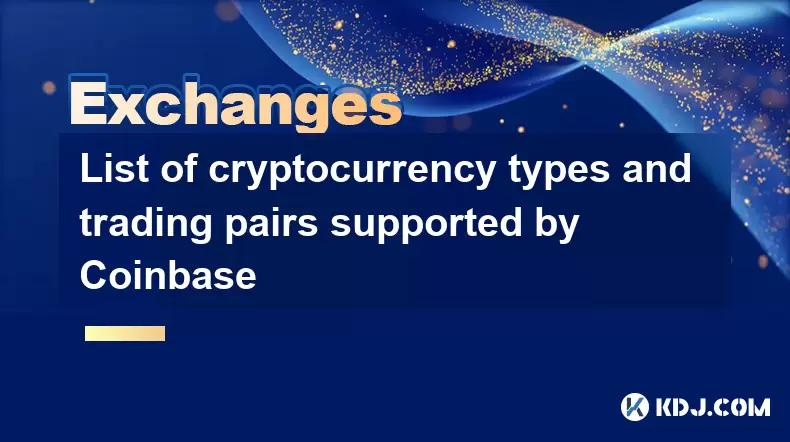
Coinbase, one of the leading cryptocurrency exchanges, supports a wide variety of cryptocurrencies and trading pairs. Understanding the types of cryptocurrencies and the trading pairs available on Coinbase is crucial for traders and investors looking to maximize their trading strategies. This article will provide a detailed list of the cryptocurrencies and trading pairs supported by Coinbase, along with explanations and potential use cases for each.
Supported Cryptocurrencies on Coinbase
Coinbase offers a diverse range of cryptocurrencies that cater to different investment needs and risk profiles. Here is a comprehensive list of the cryptocurrencies currently supported on Coinbase:
- Bitcoin (BTC): The first and most widely recognized cryptocurrency, Bitcoin is often considered a store of value and a hedge against inflation.
- Ethereum (ETH): Known for its smart contract functionality, Ethereum is the backbone of many decentralized applications (dApps) and decentralized finance (DeFi) projects.
- Litecoin (LTC): Often referred to as the silver to Bitcoin's gold, Litecoin offers faster transaction times and lower fees.
- Bitcoin Cash (BCH): A fork of Bitcoin, Bitcoin Cash aims to improve scalability and transaction speed.
- Ripple (XRP): Designed for cross-border payments, Ripple is favored by financial institutions for its efficiency and low cost.
- Stellar Lumens (XLM): Similar to Ripple, Stellar focuses on facilitating fast and low-cost international transactions.
- Ethereum Classic (ETC): A continuation of the original Ethereum blockchain, Ethereum Classic maintains the principles of immutability.
- Basic Attention Token (BAT): Used in the Brave browser ecosystem, BAT rewards users for their attention and supports content creators.
- 0x (ZRX): A protocol for decentralized exchanges, 0x aims to improve liquidity and interoperability between different blockchain networks.
- Chainlink (LINK): A decentralized oracle network, Chainlink connects smart contracts with real-world data and external APIs.
- Tezos (XTZ): A self-amending blockchain, Tezos allows for on-chain governance and upgrades without hard forks.
- Algorand (ALGO): A scalable and secure blockchain platform, Algorand focuses on enabling decentralized applications and tokenization.
- Cosmos (ATOM): A network of interconnected blockchains, Cosmos aims to solve scalability and interoperability issues.
- Dai (DAI): A stablecoin pegged to the US dollar, Dai is part of the MakerDAO ecosystem and used in DeFi applications.
- USD Coin (USDC): Another stablecoin pegged to the US dollar, USDC is backed by Coinbase and Circle.
- Compound (COMP): A decentralized lending protocol, Compound allows users to lend and borrow cryptocurrencies.
- Kyber Network (KNC): A decentralized liquidity protocol, Kyber Network enables instant token swaps on the Ethereum blockchain.
Trading Pairs on Coinbase
Coinbase supports various trading pairs, which are combinations of two cryptocurrencies that can be traded against each other. Here is a detailed list of the trading pairs available on Coinbase:
- BTC-USD: Bitcoin traded against the US Dollar.
- ETH-USD: Ethereum traded against the US Dollar.
- LTC-USD: Litecoin traded against the US Dollar.
- BCH-USD: Bitcoin Cash traded against the US Dollar.
- XRP-USD: Ripple traded against the US Dollar.
- XLM-USD: Stellar Lumens traded against the US Dollar.
- ETC-USD: Ethereum Classic traded against the US Dollar.
- BAT-USD: Basic Attention Token traded against the US Dollar.
- ZRX-USD: 0x traded against the US Dollar.
- LINK-USD: Chainlink traded against the US Dollar.
- XTZ-USD: Tezos traded against the US Dollar.
- ALGO-USD: Algorand traded against the US Dollar.
- ATOM-USD: Cosmos traded against the US Dollar.
- DAI-USD: Dai traded against the US Dollar.
- USDC-USD: USD Coin traded against the US Dollar.
- COMP-USD: Compound traded against the US Dollar.
- KNC-USD: Kyber Network traded against the US Dollar.
How to Trade on Coinbase
Trading on Coinbase involves several steps, and it's important to follow them carefully to ensure a smooth trading experience. Here's a detailed guide on how to trade on Coinbase:
- Create an Account: Visit the Coinbase website and sign up for an account by providing your email address and creating a password. You will need to verify your identity by providing personal information and a government-issued ID.
- Fund Your Account: Once your account is verified, you can fund it using various methods such as bank transfers, credit/debit cards, or other cryptocurrencies.
- Navigate to the Trading Page: After funding your account, navigate to the trading page on Coinbase. You can do this by clicking on the "Trade" button on the top menu.
- Select a Trading Pair: Choose the trading pair you want to trade. For example, if you want to buy Bitcoin with USD, select the BTC-USD trading pair.
- Place an Order: Decide on the type of order you want to place. Coinbase offers market orders, limit orders, and stop orders. For a market order, enter the amount of cryptocurrency you want to buy or sell, and click "Buy" or "Sell."
- Review and Confirm: Review your order details and confirm the transaction. Once confirmed, the order will be executed, and the cryptocurrency will be credited to or debited from your Coinbase account.
Understanding Trading Pairs
Trading pairs are crucial for executing trades on Coinbase. Each trading pair represents a market where one cryptocurrency can be exchanged for another. Here's a breakdown of how trading pairs work on Coinbase:
- Base and Quote Currency: In a trading pair like BTC-USD, Bitcoin (BTC) is the base currency, and the US Dollar (USD) is the quote currency. The base currency is what you want to buy or sell, and the quote currency is what you use to buy or sell the base currency.
- Price Representation: The price of a trading pair is represented as the amount of quote currency needed to buy one unit of the base currency. For example, if the price of BTC-USD is $30,000, it means you need $30,000 to buy one Bitcoin.
- Liquidity and Volume: Different trading pairs have varying levels of liquidity and trading volume. High liquidity and volume pairs like BTC-USD and ETH-USD typically have tighter spreads and faster execution times.
Benefits of Trading on Coinbase
Trading on Coinbase offers several benefits that make it an attractive platform for both beginners and experienced traders:
- User-Friendly Interface: Coinbase is known for its intuitive and user-friendly interface, making it easy for beginners to navigate and execute trades.
- High Liquidity: Coinbase is one of the most liquid exchanges, ensuring that traders can execute large orders without significantly impacting the market price.
- Security: Coinbase employs robust security measures, including two-factor authentication, cold storage for the majority of user funds, and insurance coverage for digital assets.
- Regulatory Compliance: Coinbase is a regulated exchange, which provides an added layer of trust and security for users.
- Customer Support: Coinbase offers comprehensive customer support, including a help center, live chat, and email support, to assist users with any issues or questions.
Frequently Asked Questions
Q: Can I trade cryptocurrencies other than those listed on Coinbase?
A: Yes, you can trade other cryptocurrencies on other exchanges or decentralized platforms. However, Coinbase's list of supported cryptocurrencies is constantly expanding, so it's worth checking back periodically to see if new assets have been added.
Q: Are there any fees associated with trading on Coinbase?
A: Yes, Coinbase charges fees for trading, which vary depending on the payment method and the size of the transaction. It's important to review the fee structure on the Coinbase website before executing any trades.
Q: How can I withdraw my funds from Coinbase?
A: To withdraw funds from Coinbase, navigate to the "Accounts" page, select the cryptocurrency or fiat currency you want to withdraw, and follow the prompts to enter your bank account details or cryptocurrency address. Confirm the transaction, and your funds will be transferred to your chosen destination.
Q: Is it possible to use Coinbase Pro for more advanced trading?
A: Yes, Coinbase Pro is a more advanced trading platform offered by Coinbase, designed for experienced traders. It provides additional features such as advanced order types, charting tools, and lower fees compared to the standard Coinbase platform.
Disclaimer:info@kdj.com
The information provided is not trading advice. kdj.com does not assume any responsibility for any investments made based on the information provided in this article. Cryptocurrencies are highly volatile and it is highly recommended that you invest with caution after thorough research!
If you believe that the content used on this website infringes your copyright, please contact us immediately (info@kdj.com) and we will delete it promptly.
- Decentralized Data: Taking the Driver's Seat in the Data Economy
- 2025-08-09 14:30:11
- Bitcoin vs. Gold: The Store-of-Value Showdown in the Digital Age
- 2025-08-09 14:30:11
- BlockDAG, Stellar, and Crypto Adoption: Navigating the Hype
- 2025-08-09 14:50:12
- Litecoin Price Surge: Riding the Wave of Institutional Interest and ETF Hopes
- 2025-08-09 14:50:12
- Chainlink's Wild Ride: Whales Are Still Loading Up on LINK!
- 2025-08-09 15:10:11
- Ruvi AI: Solana's New Challenger Dominating Token Sales with AI Innovation
- 2025-08-09 14:55:15
Related knowledge
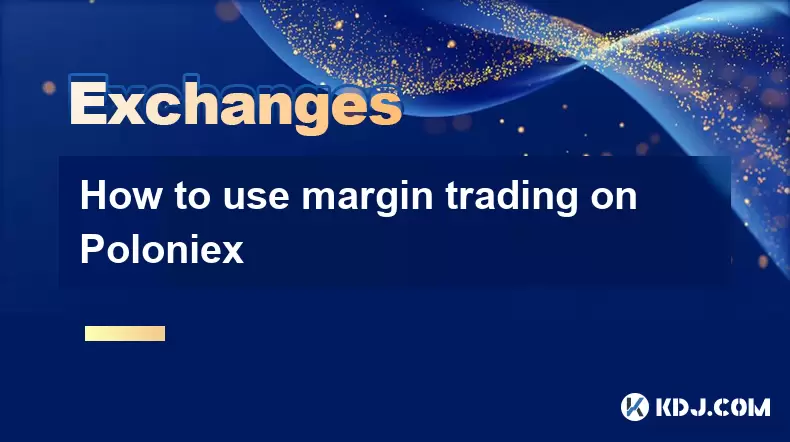
How to use margin trading on Poloniex
Aug 08,2025 at 09:50am
Understanding Margin Trading on Poloniex
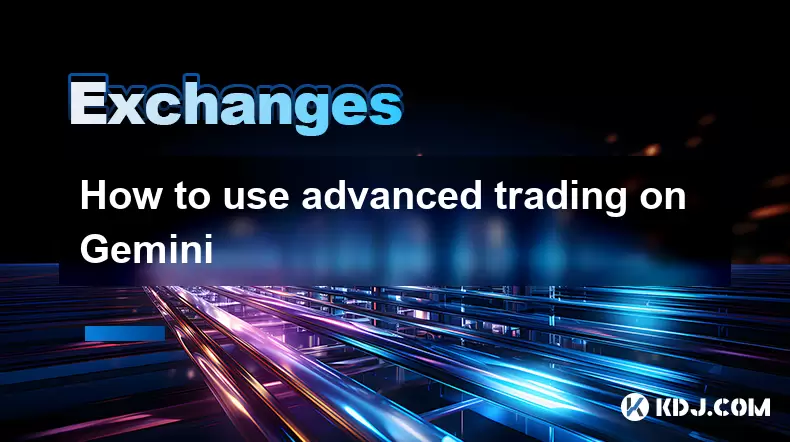
How to use advanced trading on Gemini
Aug 08,2025 at 04:07am
Understanding Advanced Trading on GeminiAdvanced trading on Gemini refers to a suite of tools and order types designed for experienced traders who wan...
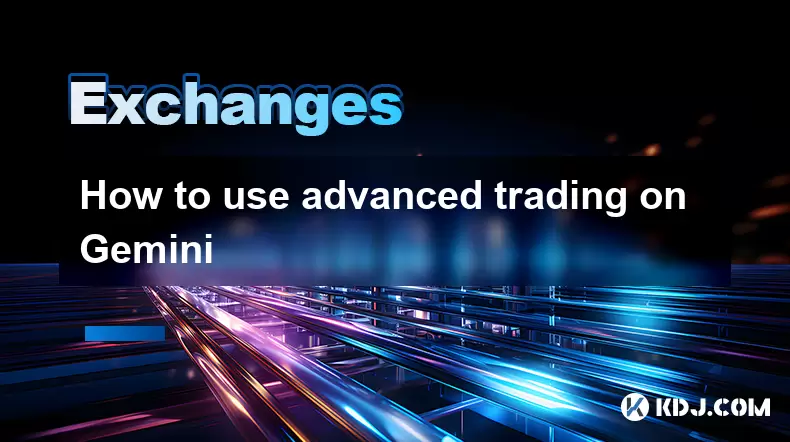
How to use advanced trading on Gemini
Aug 08,2025 at 10:56pm
Understanding Advanced Trading on GeminiAdvanced trading on Gemini refers to the suite of tools and order types available on the Gemini ActiveTrader p...

How to get my API keys from KuCoin
Aug 08,2025 at 06:50pm
Understanding API Keys on KuCoinAPI keys are essential tools for users who want to interact with KuCoin's trading platform programmatically. These key...
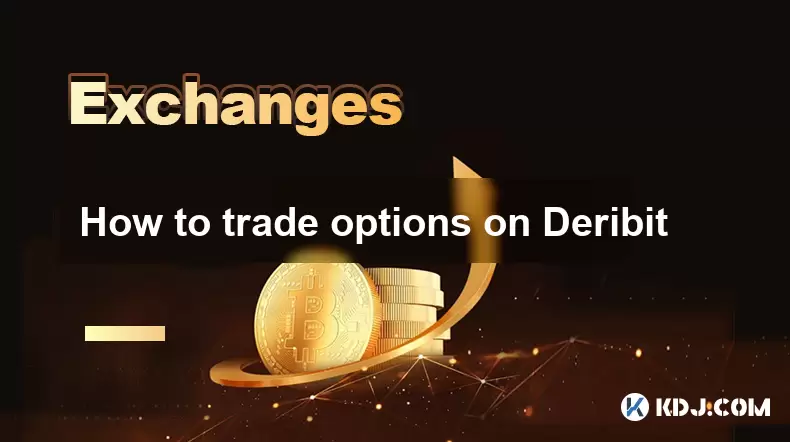
How to trade options on Deribit
Aug 09,2025 at 01:42am
Understanding Deribit and Its Options MarketDeribit is a leading cryptocurrency derivatives exchange that specializes in Bitcoin (BTC) and Ethereum (E...
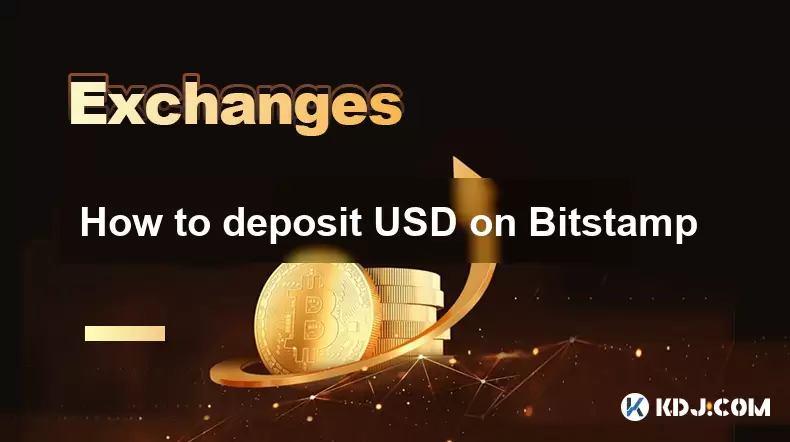
How to deposit USD on Bitstamp
Aug 07,2025 at 05:18pm
Understanding Bitstamp and USD DepositsBitstamp is one of the longest-standing cryptocurrency exchanges in the industry, offering users the ability to...

How to use margin trading on Poloniex
Aug 08,2025 at 09:50am
Understanding Margin Trading on Poloniex

How to use advanced trading on Gemini
Aug 08,2025 at 04:07am
Understanding Advanced Trading on GeminiAdvanced trading on Gemini refers to a suite of tools and order types designed for experienced traders who wan...

How to use advanced trading on Gemini
Aug 08,2025 at 10:56pm
Understanding Advanced Trading on GeminiAdvanced trading on Gemini refers to the suite of tools and order types available on the Gemini ActiveTrader p...

How to get my API keys from KuCoin
Aug 08,2025 at 06:50pm
Understanding API Keys on KuCoinAPI keys are essential tools for users who want to interact with KuCoin's trading platform programmatically. These key...

How to trade options on Deribit
Aug 09,2025 at 01:42am
Understanding Deribit and Its Options MarketDeribit is a leading cryptocurrency derivatives exchange that specializes in Bitcoin (BTC) and Ethereum (E...

How to deposit USD on Bitstamp
Aug 07,2025 at 05:18pm
Understanding Bitstamp and USD DepositsBitstamp is one of the longest-standing cryptocurrency exchanges in the industry, offering users the ability to...
See all articles

























































































